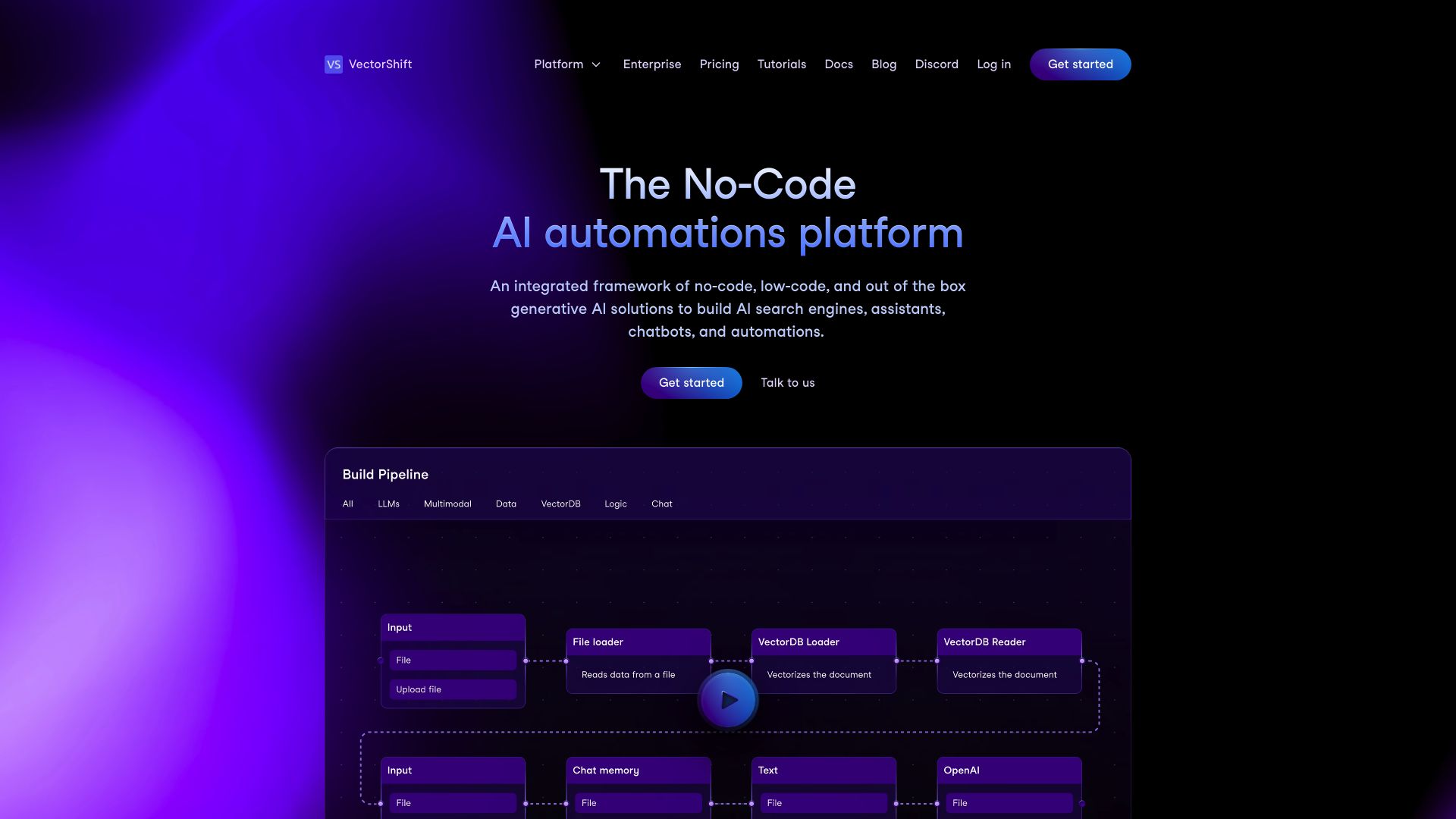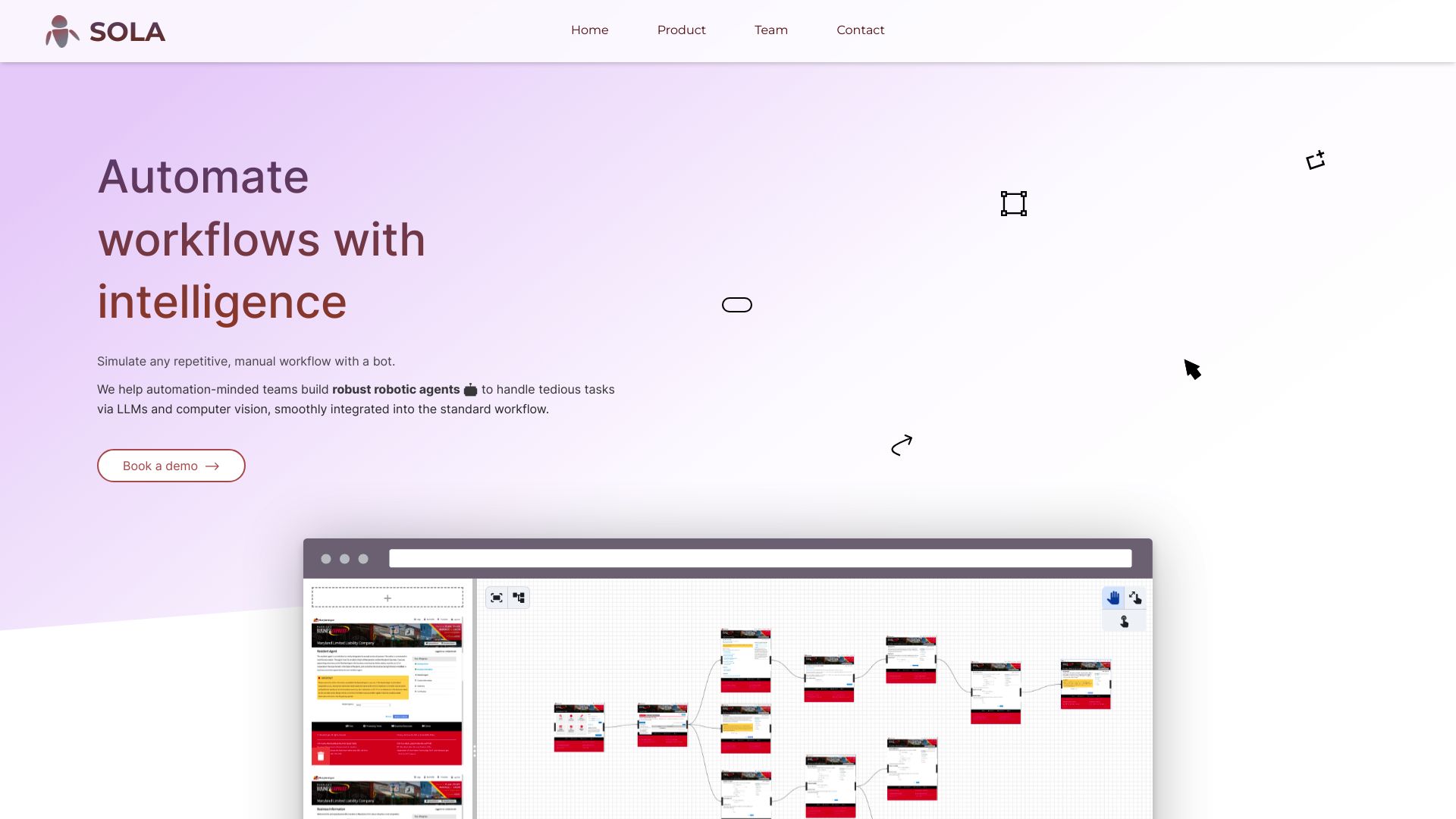VectorShift vs. Sola: AI Workflow Automation Compared
AI-powered workflow automation platforms transform business operations, enhancing efficiency and productivity. VectorShift vs. Sola offer unique approaches to this challenge, each with distinct strengths. VectorShift provides a comprehensive environment for designing complex AI workflows, while Sola excels in rapid bot creation from screen recordings.
This comparison explores their features, capabilities, and limitations, helping you determine which platform aligns best with your automation needs. We’ll also introduce SmythOS, a powerful alternative that combines versatility, advanced AI capabilities, and user-friendly design, potentially surpassing both VectorShift and Sola in meeting diverse business requirements.
VectorShift Overview
VectorShift empowers users to create and manage sophisticated AI workflows without extensive coding knowledge. The platform’s dual interface—a no-code visual builder and a code SDK—caters to both technical and non-technical users, democratizing AI development across various industries.
At its core, VectorShift offers a comprehensive suite for designing, prototyping, and deploying generative AI workflows and automations. The platform’s versatility shines through its support for diverse applications, including chatbots, search functionalities, and content creation tools. This flexibility allows businesses to centralize their AI-driven tasks, streamlining operations and enhancing productivity.
VectorShift empowers users to create and manage sophisticated AI workflows without extensive coding knowledge. The platform’s dual interface… caters to both technical and non-technical users…


VectorShift excels in its automation capabilities, enabling end-to-end workflow automation, scheduled tasks, and event-triggered actions. The platform seamlessly integrates with popular data sources and applications, facilitating centralized data management and real-time synchronization across systems. This integration prowess extends to various APIs and services, enhancing the platform’s versatility and applicability across different business scenarios.
The heart of VectorShift’s functionality lies in its pipeline dashboard, where users can craft AI workflows from scratch or leverage pre-built templates. This feature significantly simplifies the deployment process, making it accessible even to those with limited technical expertise. The platform also boasts a robust knowledge base that centralizes data and performs semantic searches, enhancing the accuracy and relevance of AI-generated responses.
The heart of VectorShift’s functionality lies in its pipeline dashboard, where users can craft AI workflows from scratch or leverage pre-built templates.
While VectorShift offers a powerful suite of tools, users should consider potential limitations. The platform’s breadth of features may require a learning curve for new users, and the extent of customization options for highly specialized use cases remains unclear. Additionally, as with any AI platform, the quality of outputs will depend heavily on the quality and quantity of input data, requiring ongoing management and refinement for optimal performance.
Sola Overview
Sola empowers businesses to streamline operations through AI-powered workflow automation. The platform enables users to create intelligent bots capable of handling repetitive tasks across various industries.


Sola’s key features include a Workflow Recorder that captures on-screen processes, an Annotation Editor for labeling steps, and a Bot Builder that converts annotated workflows into AI-powered agents. The platform integrates seamlessly with major browsers and desktop applications, allowing for versatile automation across different software environments.
Users can create bots from screen recordings in minutes, making Sola accessible to both technical and non-technical professionals.
Users can create bots from screen recordings in minutes, making Sola accessible to both technical and non-technical professionals. The platform’s adaptive learning capability enables bots to improve over time, incorporating new logic automatically. This flexibility proves valuable across sectors like legal, finance, insurance, and healthcare, where Sola automates tasks such as document processing, data entry, and compliance reporting.
While Sola offers powerful automation capabilities, it may face challenges in areas like advanced AI model integration and specialized features for constrained alignment. The platform focuses on workflow automation rather than providing a comprehensive AI agent development environment. This approach suits businesses looking to quickly implement task-specific automations but may limit users seeking more advanced AI agent capabilities.
Sola provides email and chat support during business hours, along with onboarding training and implementation services. The platform also offers developer APIs for extending functionality and integrating with existing tech stacks. However, the level of customization and AI sophistication may not match that of more specialized AI agent builders.
Feature Comparison
VectorShift and Sola offer distinct approaches to AI-powered workflow automation, each with its own strengths and limitations. VectorShift provides a comprehensive platform for designing and deploying AI workflows, while Sola focuses on rapid bot creation from screen recordings.
VectorShift’s no-code visual builder and code SDK cater to both technical and non-technical users, allowing for the creation of complex AI workflows. The platform supports a wide range of applications, including chatbots, search functionalities, and content creation tools. VectorShift’s pipeline dashboard enables users to craft AI workflows from scratch or use pre-built templates, simplifying the deployment process.
In contrast, Sola’s Workflow Recorder captures on-screen processes, which users can then annotate and convert into AI-powered bots using the platform’s Bot Builder. This approach makes Sola particularly accessible for quickly automating repetitive tasks across various software environments. However, Sola’s focus on screen-based automation may limit its capabilities in more advanced AI applications compared to VectorShift’s broader AI workflow capabilities.
While both platforms offer powerful automation features, VectorShift’s integration with foundation AI models and support for multi-agent collaboration provide a more robust environment for sophisticated AI development. Sola’s strength lies in its rapid bot creation and deployment for specific, screen-based tasks, but it may lack the depth of AI capabilities and customization options offered by VectorShift for more complex AI agent development scenarios.
Feature Comparison Table
| VectorShift | Sola | SmythOS | |
|---|---|---|---|
| CORE FEATURES | |||
| Hosted Agents (Dev, Production) | ❌ | ❌ | ✅ |
| Environments (Dev, Production) | ❌ | ✅ | ✅ |
| Autonomous Agents | ❌ | ✅ | ✅ |
| Explainability & Transparency | ❌ | ✅ | ✅ |
| Debug Tools | ❌ | ❌ | ✅ |
| Multimodal | ✅ | ❌ | ✅ |
| Multi-Agent Collaboration | ❌ | ❌ | ✅ |
| Audit Logs for Analytics | ❌ | ✅ | ✅ |
| Work as Team | ✅ | ❌ | ✅ |
| SECURITY | |||
| Constrained Alignment | ❌ | ❌ | ✅ |
| Data Encryption | ❌ | ✅ | ✅ |
| IP Control | ❌ | ❌ | ✅ |
| COMPONENTS | |||
| Huggingface AIs | ❌ | ❌ | ✅ |
| Zapier APIs | ❌ | ❌ | ✅ |
| Classifiers | ❌ | ❌ | ✅ |
| Data Lakes | ❌ | ❌ | ✅ |
| DEPLOYMENT OPTIONS (EMBODIMENTS) | |||
| Staging Domains | ❌ | ❌ | ✅ |
| Production Domains | ❌ | ❌ | ✅ |
| Deploy as GPT | ❌ | ❌ | ✅ |
| DATA LAKE SUPPORT | |||
| Hosted Vector Database | ✅ | ❌ | ✅ |
| Sitemap Crawler | ❌ | ❌ | ✅ |
| YouTube Transcript Crawler | ✅ | ❌ | ✅ |
Best Alternative to VectorShift and Sola
SmythOS emerges as the superior alternative to VectorShift and Sola for AI agent development and deployment. Our platform offers a comprehensive solution that combines powerful features with unmatched ease of use. SmythOS provides hosted agents for both development and production environments, allowing seamless transitions from testing to live deployment. Our visual builder and no-code editor empower users of all skill levels to create sophisticated AI workflows without extensive programming knowledge. SmythOS excels in multi-agent collaboration, enabling teams of AI agents to work together on complex tasks. This capability surpasses the limited collaborative features of VectorShift and Sola.
SmythOS emerges as the superior alternative to VectorShift and Sola for AI agent development and deployment… combines powerful features with unmatched ease of use.
We prioritize explainability and transparency, providing robust debugging tools that ensure full visibility into agent decision-making processes. SmythOS supports multimodal inputs and outputs, accommodating text, images, and other data types for versatile agent interactions. Our platform integrates seamlessly with popular AI models, APIs, and services, offering unparalleled flexibility in agent design and functionality. This extensive integration ecosystem outpaces the more limited options available in VectorShift and Sola. Security remains paramount in SmythOS, with features like data encryption and IP controls protecting sensitive information and ensuring compliance with stringent enterprise requirements. We offer multiple deployment options, including APIs, webhooks, chatbots, and scheduled agents, providing users with the flexibility to implement AI solutions across diverse use cases and environments. SmythOS scales effortlessly to meet growing demands, making it ideal for both startups and large enterprises. Our hosted vector database and support for various data sources enable the creation of knowledge-rich AI agents capable of processing and leveraging vast amounts of information. By choosing SmythOS, users gain access to a cutting-edge AI development environment that combines power, flexibility, and user-friendliness, surpassing the capabilities of both VectorShift and Sola.
Conclusion
VectorShift, Sola, and SmythOS each offer unique approaches to AI-powered workflow automation, catering to different user needs and technical expertise levels. VectorShift provides a comprehensive platform for designing AI workflows, while Sola focuses on rapid bot creation from screen recordings. However, SmythOS stands out as the superior choice, offering unparalleled versatility and power in AI agent development and deployment.
SmythOS excels with its intuitive drag-and-drop interface, extensive integration ecosystem, and support for multiple AI models. This platform enables users to create sophisticated AI agents that can be deployed across various environments, from APIs to chatbots and scheduled tasks. SmythOS’s ability to orchestrate multi-agent collaborations and its robust security features make it ideal for businesses seeking scalable, enterprise-grade AI solutions.
While VectorShift and Sola have their strengths, SmythOS offers a more comprehensive suite of tools for AI development, including advanced features like constrained alignment, data lakes support, and a hosted vector database. These capabilities, combined with SmythOS’s commitment to user-friendly design, make it the top choice for businesses looking to leverage AI for process automation, customer engagement, and data analysis.
For those ready to experience the future of AI-powered automation, explore SmythOS’s diverse range of AI-powered agent templates. These templates cover multiple business categories and offer a quick start to enhancing your operations with AI. To see how SmythOS can transform your workflow, create a free SmythOS account and start building AI agents with no time limit. With SmythOS, you’re not just adopting a tool; you’re embracing a platform that will evolve with your needs and drive innovation in your organization.
Last updated:
Disclaimer: The information presented in this article is for general informational purposes only and is provided as is. While we strive to keep the content up-to-date and accurate, we make no representations or warranties of any kind, express or implied, about the completeness, accuracy, reliability, suitability, or availability of the information contained in this article.
Any reliance you place on such information is strictly at your own risk. We reserve the right to make additions, deletions, or modifications to the contents of this article at any time without prior notice.
In no event will we be liable for any loss or damage including without limitation, indirect or consequential loss or damage, or any loss or damage whatsoever arising from loss of data, profits, or any other loss not specified herein arising out of, or in connection with, the use of this article.
Despite our best efforts, this article may contain oversights, errors, or omissions. If you notice any inaccuracies or have concerns about the content, please report them through our content feedback form. Your input helps us maintain the quality and reliability of our information.
